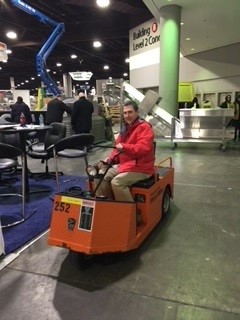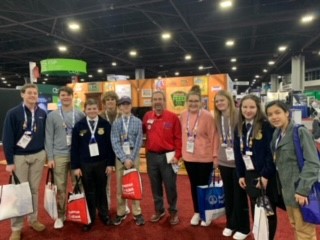
Written by: Sarah Novak | January 8, 2024
Continuing my blog series on industry leaders, here’s another move r and shaker: Nath Morris. Recently, Nath was named president of the U.S. Poultry and Egg Association (USPOULTRY), after serving as USPOULTRY’s executive vice president of expo for nine years. I became acquainted with Nath through the American Feed Industry Association’s partnership with USPOULTRY on the International Production & Processing Expo (IPPE), in which I have been having 7 a.m. calls every Friday for years with both Nath and our partners at the Meat Institute. Let’s just say, making 7 a.m. calls every week, we got to know each other very well! Below , you will find the highlights of our conversation.
r and shaker: Nath Morris. Recently, Nath was named president of the U.S. Poultry and Egg Association (USPOULTRY), after serving as USPOULTRY’s executive vice president of expo for nine years. I became acquainted with Nath through the American Feed Industry Association’s partnership with USPOULTRY on the International Production & Processing Expo (IPPE), in which I have been having 7 a.m. calls every Friday for years with both Nath and our partners at the Meat Institute. Let’s just say, making 7 a.m. calls every week, we got to know each other very well! Below , you will find the highlights of our conversation.
Q: Having been around the poultry industry for quite some time, what are your priorities as USPOULTRY president?
Morris: It’s not as difficult moving into the leadership role of an organization that has financial stability, led by a supportive and effective board, and has experienced and dedicated staff working to meet the needs of the members in alignment to the association’s mission. The board established a good transition plan, and our priorities remain to focus on member needs… are we being effective across the all-feathered industries that we represent and meeting the research, education, communication and technical service needs that our members expect? In other words, what should we continue doing, start doing and stop doing to meet those needs?
It has always been a priority of USPOULTRY to plan for a successful IPPE, not only as it relates to members’ needs, but the needs of the global poultry and egg, animal feed and meat industries. Bringing suppliers and buyers together to showcase the latest technology, relevant educational sessions with world-class speakers and networking opportunities benefits our businesses from farm-to-fork in providing a safe, healthy food source.
Q: What do you see as the biggest challenge that the poultry and egg industry will face in the coming five, 10 or 15 years?
Morris: Currently, the industry’s biggest challenge remains highly pathogenic avian influenza (HPAI) and the potential impact it has on domestic production costs and product supplies, international trade and the differences in the global responses for preventing and treating infected flocks. In the past, HPAI seemed to be more of a seasonal issue, but now, we are seeing yearlong challenges. Even though the U.S. and Canada saw a decrease in outbreaks and the number of infected birds in 2023, compared to 2022, we must remain vigilant. All foreign animal diseases that are prevalent in other countries but not currently detected in the U.S. must continue to be monitored and controlled to prevent outbreaks.
The industry will also continue to face challenges in attracting and retaining labor for our production and processing facilities. This brings opportunities for the development of new technology in equipment and processes that will help overcome labor issues. This also opens the door for how to effectively incorporate artificial intelligence (the other AI) in our process business models.
Q: One of USPOULTRY’s important programs is student education and getting people involved in the industry. What would you tell someone who is considering working in the poultry and egg industry?
 Morris: IPPE attracts MANY students from college students looking for internships or careers in the industry as part of the College Student Career Program (CSCP), to high school students who participate in FFA or are enrolled in agribusiness programs, to Ph.D. and master’s degree graduates who can fill high-demand technical positions in disciplines across the spectrum in the industry. The USPOULTRY Foundation makes the CSCP program possible through recruiting and program funding so students can interview with industry companies AND visit the tradeshow floor at IPPE.
Morris: IPPE attracts MANY students from college students looking for internships or careers in the industry as part of the College Student Career Program (CSCP), to high school students who participate in FFA or are enrolled in agribusiness programs, to Ph.D. and master’s degree graduates who can fill high-demand technical positions in disciplines across the spectrum in the industry. The USPOULTRY Foundation makes the CSCP program possible through recruiting and program funding so students can interview with industry companies AND visit the tradeshow floor at IPPE.
I would tell anyone considering the industry that there are so many opportunities across the industry. We need good people who want to grow in their career.
Q: How does USPOULTRY involve their members to ensure active member engagement?
Morris: Keeping our mission points in mind (research, education, communication and technical service), member companies have many opportunities to be actively involved in USPOULTRY. On the research side, we have members on the Foundation Research Advisory Committee, which meets twice annually to set the industry’s research priorities and select USPOULTRY research projects. USPOULTRY presents 13 seminars and workshops annually and each one has a planning committee made up of members and USPOULTRY staff. Through our communications department, all member companies have access to completed research summaries, daily e-newsletters (Poultry Wire), other monthly publications, podcasts and the association’s annual report. Members also have access to technical management tools in the areas of safety and health, food safety, environmental, animal welfare and information technology. In addition, member companies who produce poultry products can pre-register for complimentary badges to attend IPPE and discounts for the USPOULTRY seminars and workshops that fit their areas of responsibility. We are always focused on providing timely and relevant resources that members can use to help them in their businesses.
Q: You were very involved with IPPE for several years, what are you most proud of with the event?
Morris: Despite the significant COVID disruption that prevented the industry’s face-to-face event in 2021 from taking place and the lagging return to normal, I am very proud of the efforts by the USPOULTRY team and our partners at the AFIA and Meat Institute to grow the IPPE into the size and scope it has become. 2024 will bring the largest number of exhibitors (1,400+) and exhibit floor space (617,000 square feet) to Atlanta. IPPE has become a must-attend event for the meat, poultry, egg and feed industry with visitors attending from 130 countries across the globe. We take pride in how we bring all the parts of the event together, and that attendees look forward to coming back because they meet their objectives.
To witness in 12 years that IPPE has doubled in size and has become one of the top 25 trade shows in the U.S. is amazing.
Q: When you are not working on behalf of the feather industry, what do you do for fun?
Morris: My wife and I enjoy spending time together with the kids and grandkids, gardening, cooking, dancing, playing with our King Charles spaniels, hiking in the beautiful northeast Georgia mountains and frequenting our favorite eating establishments. Of course, we always look forward to enjoying the family vacations in the mountains or at the beach. My advice: Life is too short. Make time to spend with family and friends and always ‘stop and smell the roses’!
Comments See our policy on comments